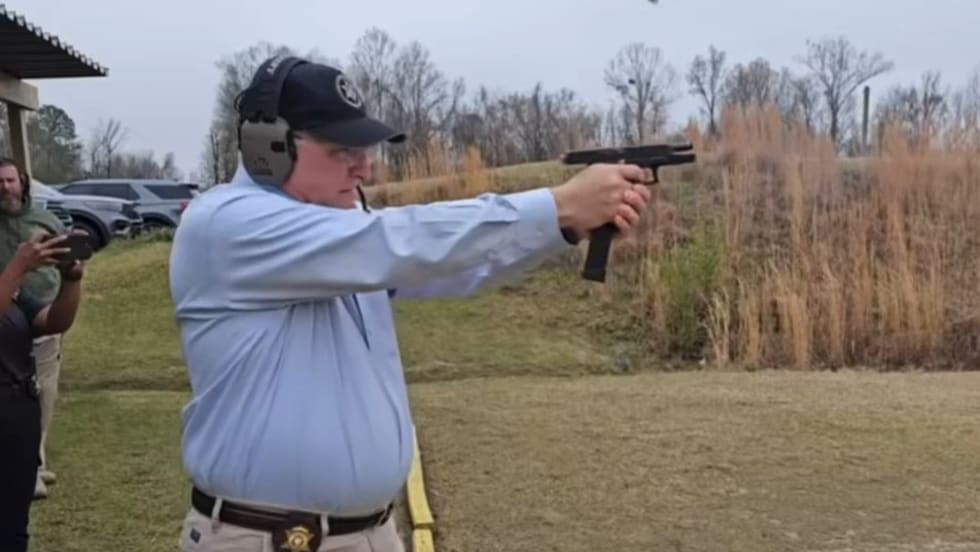Dave Grossman is a man on a mission. By all rights, the retired U.S. Army lieutenant colonel and Ranger should be enjoying a life of leisure. Instead, Grossman spends most of his life on the road, traveling from town to town like a tent evangelist teaching law enforcement officers and military personnel about the psychological and physiological effects of combat and preaching a contemporary version of the warrior code.
Dave Grossman is a man on a mission. By all rights, the retired U.S. Army lieutenant colonel and Ranger should be enjoying a life of leisure. Instead, Grossman spends most of his life on the road, traveling from town to town like a tent evangelist teaching law enforcement officers and military personnel about the psychological and physiological effects of combat and preaching a contemporary version of the warrior code.
In 1995, Grossman, a psychology and military history professor, published “On Killing: The Psychological Cost of Learning to Kill in War and Society” and coined the term “killology” for the study of killing. The Pulitzer Prize-nominated book looks at the effects of killing on cops and soldiers with the same kind of unblinking eye that Kinsey studied sex. It even led to the establishment of the Killology Research Group (www.killology.com).
His writings and his research have made Grossman one of the most in-demand speakers in the country. He gives his presentation “The Bulletproof Mind” (which he will give at TREXPO East in Chantilly, Va., on Aug. 23) about 300 times a year to police agencies and military units. And he has no plans for slowing down. “You know after 9/11, I think I’d be a little crazy if I couldn’t do something,” he says. “This isn’t hard at all compared to what the boys overseas are doing.”
Grossman’s travels and his constant contact with police officers who have been forced to kill in the line of duty led to the publication of “On Combat,” the 2004 follow-up to “On Killing.” Written with retired Portland, Ore., cop Loren W. Christensen, “On Combat” is both a look at the psychological and physiological effects of combat and a treatise on the mindset of the warrior.
In “On Combat” Grossman and Christensen divide the population of the world into sheep, wolves, and sheepdogs. The majority of people are sheep, quietly living their lives unaware of the evil wolves that wait to prey on them. Police, soldiers, and other warriors are the sheepdogs that prevent the wolves from devouring the sheep.
Recently, Grossman stopped working, traveling, writing, teaching, and preaching long enough for an exclusive interview with Police Magazine editor David Griffith in which he discussed the role of the warrior in society, the effects of killing on law enforcement officers, and how officers can protect themselves from psychological injury in the aftermath of armed combat.
POLICE: The primary focus of “On Killing” is the military. And I would estimate that two-thirds of “On Combat” is about police. What happened in the eight years between the two books that made you want to write so much about law enforcement?
“On Killing” does have a very military focus. I was in the Army when I wrote it. But it’s become required reading at the FBI Academy. What happened is that, even though the book has a military focus, the military for decade after decade really wasn’t doing any killing.
In contrast, the law enforcement crowd was getting the acid test every day. They were calling me out to do a lot of speaking. Of course, after 9/11 everything changed. That’s meant great gobs of work for our military. So since 9/11, I’ve started to get a lot of military examples. And now “On Combat” has come out, and it’s been embraced by the military, even though it’s got a law enforcement theme.
There’s great interaction between those two communities. And I think we should be very hesitant to draw any kind of hard line in between those two. Combat is combat. The lawful taking of human life is the lawful taking of human life, whether the uniform you wear is blue or camouflage. The dynamics are very similar.
POLICE: The title of your presentation at TREXPO East is “The Bulletproof Mind.” Can you give us some insight into what you mean by a “bulletproof mind?”
The idea is to do for the mind what body armor does for the body.
Step one of bulletproofing the mind is to identify the magnitude of the threat. Post-traumatic stress disorder impacts not just you but also your spouse and your kids. If you lose a limb, it’s not contagious. But if you come home with a load of mental baggage who has to live with it? Your loved ones. It is the gift that keeps on giving.
Step two is what I call “no pity party.” You understand the magnitude of the threat, now put it into perspective. We had half a million psychiatric casualties in World War II, but millions and millions of kids came home and were just fine. You will be too. If you create an expectation that you will be destroyed by combat, then it will become a self-fulfilling prophecy. Nietzsche said, “That which does not kill me only makes me stronger.” The vast, vast majority of people come out of combat a bit better for their experience.
So no pity party. But on the other hand, no macho men. You’re crazy to turn down state-of-the-art resources. If something is wrong, then deal with it.
The final step of the bulletproof mind is to understand the danger of denial. You can take this soft, fluffy blanket of denial and pull it up over your head, but denial will kill you twice. It kills you once because at the moment of truth you are physically unprepared, and you die like any other sheep. Then, denial kills you again because even if you physically survive, you’re psychologically destroyed.
We need to hunt down every aspect of denial in our lives and prepare ourselves to the utmost of our ability for the reality of the world we live in. And that means things like carrying off duty; it means training. It means understanding that you may be in combat, that you may have fear responses. Here’s what they look like and here’s how they manifest themselves in your body, and here’s what you can do about it.
POLICE: What is the biggest misconception that cops tend to have about armed combat?
It falls into two media-induced, self-fulfilling prophecies.
One is the constant pity party. The media will focus on the negative. They will talk about the people who are destroyed in combat and create an expectation that you will be destroyed by combat.
The other media fantasy is the macho man. I love John Wayne. I’m an enormous fan of the Duke. But the truth is that John Wayne was an actor. He could take on the entire Japanese army by himself and rock on. But real warriors are human.
Basing what you know about combat on Hollywood is like basing what you know about elephants on Walt Disney’s “Dumbo.” Imagine walking away from the movie theater convinced that elephants can fly, well that’s pretty goofy, right? But the truth is that we have equally goofy things in our heads when it comes to combat.
Hollywood myth has given us the pity party, the belief that every combat veteran is destroyed and scarred for life. They’ve also given us the myth of the macho man. There’s danger to the left and danger to the right. If something is wrong and you try to suck it up and drive on, it can end up destroying you, your family, and your loved ones. On the other hand, having the expectation that you will be destroyed by combat can become a self-fulfilling prophecy. Some people are hurt, but the vast majority are not.
You know the vast majority of veterans are solid. And a new “greatest generation” is coming home [from Iraq and Afghanistan]. They are enriched and ennobled and empowered by their experience. But the media only wants to focus on the negative.
POLICE: Can you give us an example of a veteran who is part of this new “greatest generation” that’s coming home?
I presented an award to a cop in Wisconsin. He was also a reserve Marine, and his Marine unit was deployed to Iraq. He received a Bronze Star for his actions in Iraq. And they’ve been pretty stingy with awards over there.
He was on a crossroads and a car bomb was coming at him. He killed the driver with a well-placed round through the windshield, but the vehicle was still coming. He was standing his ground, sinking rounds into the vehicle, trying to stop the vehicle when it exploded. He was hurled back against his Humvee and both his legs were snapped off at the thigh.
This officer has now had massive reconstructive surgery—you know, titanium rods reconnected to his thighs, massive physical therapy, and numerous operations. And he’s now back on the street. He’s back on duty. He’s passing the PT test. He’s fully recovered. He’s a cop on the beat in Wisconsin. And he says, “There’s nothing life can throw at me that I can’t handle.” There’s titanium in this cop’s thighs, and there’s titanium in his soul. That’s the kind of person that’s coming back.
POLICE: What are we doing right to safeguard the mental health of our returning vets? Conversely, what are we doing wrong?
We’re doing more things right to safeguard the returning veterans than ever before. Most of what we learned we learned from the law enforcement community because they are the ones who are in combat every day. We learned about the need for debriefings. We learned about the need for therapeutic tools that are available to us.
The vast, vast majority of the kids coming home from the war are just fine and think they are better for the experience. Of the ones that are [psychologically] hurt, most of them are kids who have mild cases of PTSD that in previous years we would have never identified.
What are we doing wrong? It involves the media. It’s this tremendous dynamic in which the media focuses on the negative. A lot of it is the anti-war dynamic in the media. A lot of it is the very nature of the media.
They focus on the ones who are hurt and create an expectation that they’re all going to be hurt, rather than give this balanced presentation that: A, the vast, vast majority are just fine indeed they are better for the experience. B, the ones who are hurt are ones with mild cases who in past years we would have not been able to identify. C, when we do get done with the ones who are hurt, they are better than they have ever been before.
This is the story that’s not getting out, and the failure to report that story is the number one dynamic that creates PTSD through expectation.
POLICE: You talk a lot in “On Combat” about how complacency can kill cops. How can officers guard against complacency?
You have to embrace the warrior spirit. It’s this business of being a “sheepdog” and accepting responsibility for human lives. You know we all moan about complacency, but it is actual active processes that overcome it.
If you carry your weapon off duty, then you have made an active step every day of your life to avoid complacency. Being the warrior, that’s not something that you turn on and turn off. It’s something you live, you drink, you breathe.
Another way to avoid complacency is through your hobby. Everybody needs a hobby. Your emotional survival in this job demands that you have a hobby. And it’s a very pure and beautiful thing when your hobby reinforces your survival skills. Competitive shooting, martial arts, paintball, there’s all sorts of things that you could be doing with your family, with your loved ones, and with your friends that simultaneously reinforce your survival skills and give you a hobby that is good for your emotional survival.
Overcoming complacency is all about taking active measures to embrace the warrior spirit, to become the knight, the paladin, the sheepdog. You can sit and gripe about complacency or you can take active measures to prevent it.
POLICE: Let’s talk about the term “warrior” for a moment. The word is really overused in our society. For example, athletes are called warriors by sportscasters. What is your definition of a warrior? And how do officers fit that definition?
The way I define “warrior” is the one who moves toward the sound of the guns, who went up the steps of the World Trade Center when everybody else went down. The warrior is a soldier in distant lands who is hunting down our enemies. The warrior wakes up every morning and knows that if somebody has to go in harm’s way it’s me.
The warrior is the one who has made the active choice to put their life on the line for their fellow citizens every day, whether it’s cops, soldiers, firefighters, or maybe even armed citizens.
Piss on the athletes. They will run as soon as somebody pulls a gun. The warrior is the teacher [who was killed] in Red Lake, Minn., a year ago. When the killer was coming down the hallway, she leaped forward and blocked the door with her foot. She physically blocked the door with her body and wedged it shut with her foot while she sent the kids into an adjacent classroom.
The warrior is any citizen who has accepted responsibility for his or her fellow citizens, knowing that a moment of truth will put their life on the line.
POLICE: After 9/11 it seemed like most Americans rallied behind their police and soldiers. But, as you know, that passed quickly. Is it just the nature of sheep to be repulsed by the violent work of the sheepdog?
It’s the nature of the sheep to sink back into complacency. And complacency is the enemy. Unless you are really invested in the warrior spirit, then complacency is your natural state.
The sheep are just that. They are sheep. They sink back into complacency as soon as the danger is gone. I mean the sheep have two speeds: graze and stampede. And that’s all that they are capable of.
But when you look back into American history, the American people can be some mean suckers [when they stampede]. I mean when somebody pushes us hard...Look at the Japanese. One day, they pushed us too far. And then we were really, really sorry. That’s the sheep.
Churchill said, “Democracy is the worst form of government except for all the others.” And it’s true because democracy functions on this weird kind of mob hysteria. We whipsaw back and forth from complacency to stampede.
The warriors are the ones who when everybody else is in a state of complacency still keep their powder dry.
Throughout our history, there’s never been more than a real core of warriors. They are the ones who in a time of trial that we turn to.
POLICE: In general, the military kills at a much greater distance than police officers. Most police shootings occur within 21 feet. Does the physical proximity of the suspect tend to result in greater mental distress for police officers than it does for the military?
Distance becomes a [psychological] buffer in many killings, and cops have to kill up close. There is an exception to that and that’s our snipers. You know police snipers, they’ve got distance, but they often have to observe this guy sometimes for hours through a high-powered scope and look at him in intimate detail, then turn around and kill him. That’s hard.
But I think that maybe the hardest [kill] is when you’re right up next to them. You’re breathing the same air, you’re clutched in close combat, you smell him, you feel him, you feel his heartbeat against your heartbeat. You press your weapon into the man’s side, you pull the trigger, and you feel him die beneath you. It doesn’t get much more intimate than that. You have all of your senses simultaneously giving you the feel of this human being as you kill them. And there can be no doubt that that can be pretty hard.
But it’s not overwhelming. It’s not something that’s guaranteed to destroy you. Because nothing is guaranteed to destroy you. Still, that’s definitely the upper end of the scale of traumatic events that we need to recognize and deal with.
POLICE: What should a buddy do to help a fellow officer who has been forced to kill someone in the line of duty?
The first step is just to tell them, “I’m glad you’re OK.” If the individual has been hurt, there’s great power in coming up and saying, “The worst is over. We’re here now.”
These are not hollow, trite responses. You know when somebody is injured we have a set of standard responses: Stop the bleeding, clear the airway, treat for shock. I really think a similar set of responses should be in place for somebody who has had to kill. Step One is: “Hey, the worst is over, we’re here now.” Step Two is to tell them, “Hey, I’m glad you’re OK.” And make sure they’re OK.
Then I have this message for chiefs, captain, lieutenants, and sergeants. If they’ve taken your officer’s weapon for forensic purposes, turn around and hand him your own weapon. Make sure he’s not still twitching and jerking, make sure he’s OK. Then give him your own weapon and say, “Hey, they took your weapon. Here take mine. I’ve got a backup.”
There’s a lot of power in that. This guy just had to use his weapon to save his own life and now he’s had to give that weapon away. The weapon is a symbol of his warriorhood. It’s a symbol of his authority and society’s trust in him. Doing this is the psychological equivalent of wrapping a jacket around someone who is buck naked and alone. People find it of great value.
POLICE: What is the primary mistake that agencies make when dealing with officers who have killed in the line of duty?
The primary mistake is when they treat them like a criminal. We train them, we equip them, we order them to use deadly force. And then when they do it, we treat them like criminals, like they have committed a homicide. Well they’re not like criminals.
Our cops are not disposable objects. They are not like plastic spoons that we use one time and then throw away. We train them, enable them, equip them, order them to use deadly force in the defense of human life. And when they do that they need to be treated with respect and dignity.
That means we don’t interview them in the same way and in the same place that we interview criminals. That means that we have the peer support (fellow officers who have been in lethal force encounters) there to help them. That means that as soon as it’s humanly possible that we replace the gun that we had to take away from them. We continue to give them that dignity.
If you want one-shot cops, if you want disposable objects, if you want plastic spoons for police officers, if you want to use them one time and throw them away, then go ahead and treat them like criminals. It quite frankly enrages me that some agencies and some investigating officers do this to their fellow officers. They say, “Well, he’s just another citizen who has committed a homicide.” No, he’s not. He’s an individual that you trained, enabled, equipped, and ordered to use deadly force. And then he did what you ordered him to do, and you treat him like a criminal. Now that’s criminal. That’s negligent. That’s obscene...to take your warriors and treat them in that manner.
We need to do everything we can to protect these individuals. Or we just accept the fact that we’ve got plastic spoons, disposable objects, one-shot cops, and we just go ahead and break them after they’ve done what we ordered them to do and be prepared to put them on retirement and throw them away. But I submit to you that that’s immoral, to treat a human being like a disposable object. It’s immoral and it’s unacceptable. So we need to accept the fact that this is not another citizen who has committed a homicide. He’s just done what we’ve ordered him to do. And we need to treat him with dignity, professionalism, and compassion.
POLICE: I’ve met officers who have killed several people in armed combat. I hate to ask this, but do you think it gets easier?
I don’t think there’s any doubt. The truth is that the first is pretty much the hardest. After that, you know what to expect. It seems like a trite analogy, and I use it with great caution, but it’s very similar to hunting. The first deer you ever drop is incredibly exciting; people get “buck fever.” But as you kill more and more deer, you’ll never again have that same intensity that overwhelming experience that you had the first time.
In passing, I’ll say that I think one of the best ways to prepare for combat is hunting. If the first large mammal you ever kill is a member of your own species and the first large mammal you ever see die a violent death is a member of your own species, then that can be a real kick in the tail.
POLICE: But the problem with that for the individual who has killed more than once in the line is that he or she may ask, “What’s wrong with me? I don’t feel like I did before.”
Yes. And that’s certainly something that I address in “On Killing.” You can feel bad for not feeling bad. You know a lot of people don’t feel bad after the first one. A lot of mature warriors have told me, “My first kill I was, ‘F___ing A. Hooah!’” A lot of guys have told me, “It was the high point of my life. I prepared for a lifetime for this incident. I killed a bad guy.” They were ready for their moment, and they felt nothing but solid satisfaction. And let me tell you there is nothing wrong with that. This business of feeling bad because you don’t feel bad can cause you to spiral out of control.
The more you can be informed, the more you can read case studies, the more you can get inside the heads and hearts of those who have been there, then the less traumatic it will be when it happens to you. And that’s the goal of both “On Killing” and “On Combat,” to give you this vast wealth of experiences and responses from countless other individuals to help you put your own response into perspective.











